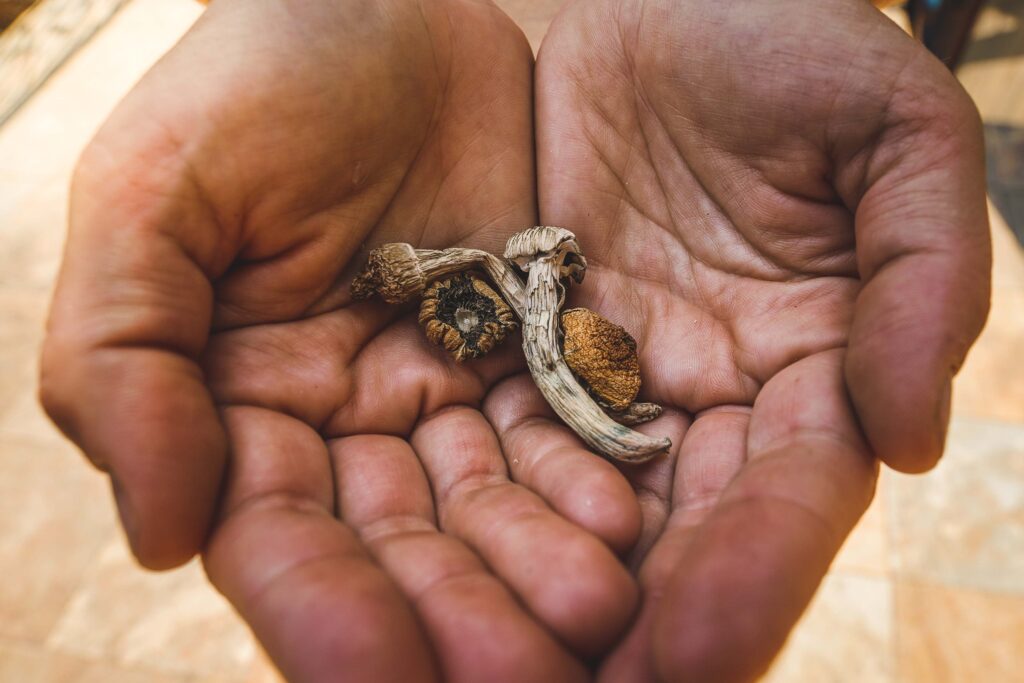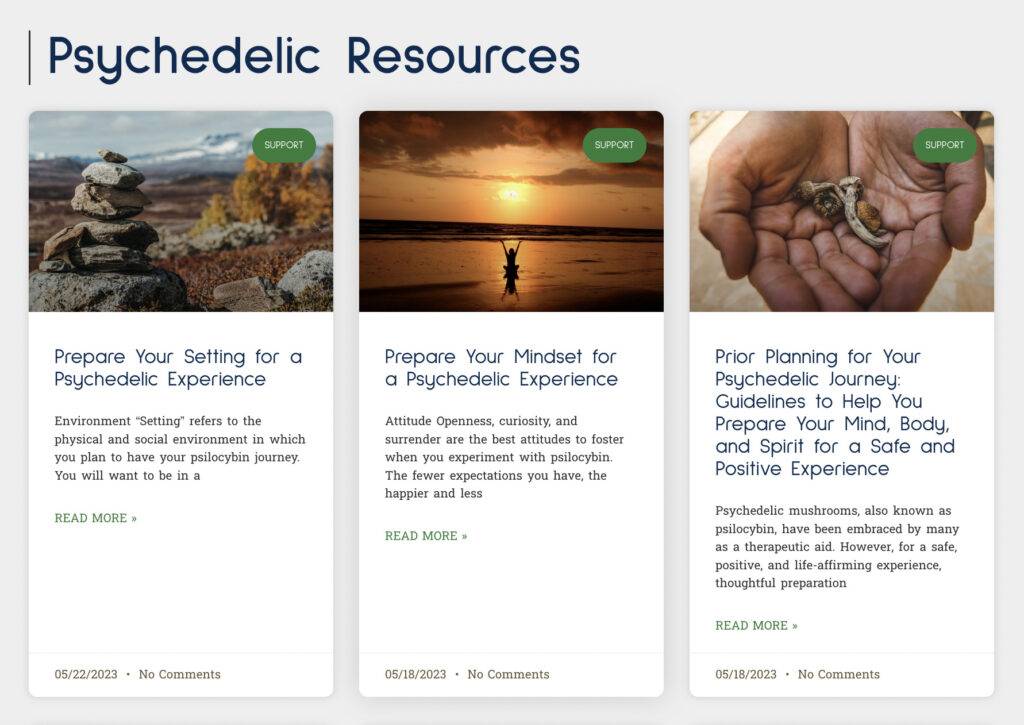Attitude
Openness, curiosity, and surrender are the best attitudes to foster when you experiment with psilocybin. The fewer expectations you have, the happier and less anxious you’ll be throughout the process. Holding on to unmet expectations often causes unnecessary disappointment.
You may be disillusioned if you expect to have the same experience you’ve read or heard about in videos, books, or trip reports. Your unique life experiences will result in a journey that cannot be compared with the experiences of others.
Accept Discomfort
Some journeyers may report feeling different types of physiological discomfort during the journey. Anxiety is common during the come-up phase, which may last an hour or so after ingestion. Some sensitive journeyers may feel unpleasant sensations throughout the experience. Nausea and stomachache are the most common side effects of taking mushrooms.
Here is a list of potential physical effects you may experience during your journey:
- Increased heart rate
- Muscle relaxation or tension
- Shakes/tremors
- Jitteriness
- Cramps
- Nausea
- Vomiting
- Pupil dilation
- Dry mouth
- Sweating
- Chills
- Numbness
- Drowsiness
To help reduce the risk of gastrointestinal discomfort, you may want to grind your mushrooms into a powder and make a mushroom tea, or soak the powder in lemon juice for 15–20 minutes before consuming. Ginger tea, ginger ale, or ginger candies might help alleviate some symptoms. You can also try taking ginger half an hour before the mushrooms. Other remedies for nausea include digestive enzymes, papaya enzyme pills, dry crackers, essential oils of lemon, peppermint, or cinnamon, chocolate, kola nuts, Dramamine, and Gas-X tablets. Each person reacts differently to these substances, so be sure to choose what you feel is best for your body.
Here is a list of potential psychological effects that might manifest on your journey:
Heightened senses or awareness of physiological processes (e.g. heartbeat)
- Restlessness
- Trouble focusing
- Disorientation
- Inability to determine what’s real
- Tension
- Anxiety and panic
- Paranoia
- Euphoria
- Visual illusions with eyes open and closed
- Intensification of colors
- Proprioceptive changes (e.g. body may feel large or tiny)
- Synesthesia (e.g. seeing sounds or hearing colors)
- Experience of merging with the environment/universe
- Time and space may be experienced as infinite or nonexistent
- Perception that the experience will never end
- Highly symbolic experiences(e.g. visions involving religious or mythical signs, symbols, and scenes, perhaps beyond your personal field of experience or knowledge)
- Regression to a younger age
- Reliving the birth experience
- Sensations related to any diseases or operations you’ve had
- Experiences described as mystical or spiritual
- Loss of subjective self-identity, or “ego dissolution”
- Perception of losing your mind or going crazy (related to the “ego dissolution” experience)
- Transpersonal experiences that transcend the limitations of space, time, and your physical senses
- Assuming the identification/ experience of another person
- Heightened transference (i.e. projecting strong emotional attitudes of key figures from your past/present life, especially close family members, onto you or yourself or your environment)
If you struggle, remind yourself that everything is temporary and the journey will end. Keep reassuring yourself that you are safe, and it will all pass. Trust that whatever physical or psychological effects you encounter are natural. Welcome every sensation with curiosity. Accept and fully surrender to whatever arises. The decision to surrender often transforms the experience instantly into a positive one.
Taking deep, slow, and continuous breaths may help you through challenging moments. Putting your hands in a prayer pose or on your heart or belly can also soothe your mind and body.
If you have a sitter with you, you can always ask them to hug you or hold your hand. You can also ask for help to navigate, breathe, or ground. You may find asking for help difficult, so the act of simply asking and receiving can be healing.
Recognize & Embrace Fear
Fear of the unknown and fear of loss are common to the human experience. As a result, many people never leave their comfort zone because it feels familiar and reliable. Anything that challenges their beliefs or worldview can feel overwhelming.
Paul Stamets, one of the world’s leading mycologists and psilocybin advocates, has said, “the fear of the loss of self-control is the central issue amongst all users as their dosage increases. Those willing to let go and who do not fear their inner self, seem better prepared to tolerate higher doses. They flow with, not against, the tide of the experience.”
At certain points during your journey, you may feel like you are “losing your mind” or dying. You may be afraid to let go of control, or feel confused about rapid psychological and emotional changes. You might forget who you are. You may worry that you’ll remain stuck in this state forever or encounter a sense of emptiness or nothingness. These experiences are extremely common. It’s essential to release the desire to control, and surrender to wherever your mind might wander. Breathe and remember that you are safe.
There’s no way to predict what you will see or experience during your journey. Some of your experiences may feel alien, other-worldly, horrifying, terrifying, confusing, shocking, or painful. If you can face these unpleasant experiences with curiosity and accept that they are temporary, you will come out of the journey feeling lighter and brighter.
Allow Emotions
While parts of your journey may feel challenging, you may also encounter your hidden strengths as you explore deep avenues of consciousness. You may feel an overwhelming sense of innocence, softness, resilience, love, or compassion. You may also come across painful thoughts, feelings, and impulses you don’t usually allow yourself to see or feel. Shame, guilt, grief, anger, frustration, restlessness, may all come up during your journey.
To feel whole as you experience the medicine, you can practice opening to every aspect of yourself and expanding the range of emotions you allow yourself to feel. You can bring greater unity to the different aspects of your being.
Although some of the most pivotal journeys can feel overwhelming or challenging, they also allow you to fully experience and release pent-up emotions safely without hurting yourself or others. You may find yourself expressing or releasing emotions in many ways: yelling, cursing, crying, wailing, laughing, dancing, singing, speaking, writing, making sounds, rolling on the ground, praying, shaking, trembling, punching a pillow, or vomiting.
At times, you may feel like you have lost partial or full control of your body’s movements. As long as you are safe in your surroundings, it’s usually wise to let your body move the way it wants, no matter how weird or scary it may seem. It knows what it’s doing. Try to cultivate patience, stillness, and equanimity with everything that happens during your journey.
Prepare a Mantra
A mantra may help you through challenging periods of the journey and act as an anchor for weathering the most intense parts of the experience. Make up your own or borrow one you like. Here are some examples:
- Trust, let go, be open
- I am safe
- It’s okay. Everything is okay.
- I am being guided where I need to go
- All shall be well
- Listen, learn, love
- Breathe through the waves
If you have faith in God, Jesus, Buddha, Mohammad, Krishna, or another entity, spirit, person, or energy, you may wish to include them in your mantras or throughout your journey in general. You may find prayer beneficial or even essential before, during, or after your journey.
Prepare Your Body
For days or weeks before your journey, commit to living a healthy lifestyle and abstain from certain sensory inputs that may cause upsetting or uneasy states of mind. Avoid alcohol, cigarettes, and other substances that similarly affect the body, mind, and spirit.
Some people consume cannabis in the form of CBD or THC before, during, or after a journey. For others, avoiding cannabis may be the best option.
Reduce or eliminate animal products and processed foods that cause mucus to accumulate.
Eat foods that nourish your body, including organic fruits and vegetables, drink plenty of water, and make juices or smoothies. Kombucha and other fermented foods and drinks can help rebalance gut flora.
Make sure you sleep well and feel rested.
Consider pampering yourself with a massage or a day at the spa to help calm your nerves and prepare your body for surrender and inner exploration. A warm bath at home with music or essential oils can also provide similar benefits.
Transition into a calmer, more reflective state of mind and body. Practice regular meditation, yoga, breathwork, or other self-care techniques.
Spend more time in nature and reduce screen time.
Ideally, you want to begin your journey with clean, empty bowels. On the day of your journey, consider fasting for four or more hours before ingesting psilocybin. If you find it comforting, you can have a light snack (e.g., a sandwich, nuts, fruit, or a smoothie) with your dose or slightly beforehand.
If you are using any medications or other drugs (prescription or otherwise), research potential
contraindications and, if necessary, follow guidelines for tapering off from these substances.
As mentioned in a previous section, microdosing can be a great way to prepare for a more substantial dose.









